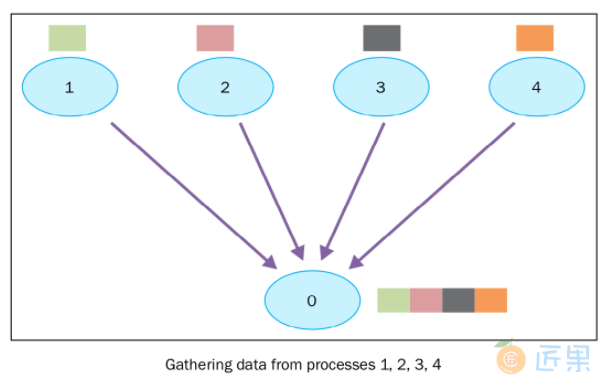gather 函数基本上是反向的 scatter ,即手机所有进程发送向root进程的数据。 mpi4py 实现的 gather 函数如下:
recvbuf = comm.gather(sendbuf, rank_of_root_process)
这里, sendbuf 是要发送的数据, rank_of_root_process 代表要接收数据进程。
1. 如何做…
在接下来的例子中,我们想实现上图表示的过程。每一个进程都构建自己的数据,发送给root进程(rank为0)。
from mpi4py import MPI
comm = MPI.COMM_WORLD
size = comm.Get_size()
rank = comm.Get_rank()
data = (rank+1)**2
data = comm.gather(data, root=0)
if rank == 0:
print ("rank = %s " %rank + "...receiving data to other process")
for i in range(1, size):
data[i] = (i+1)**2
value = data[i]
print(" process %s receiving %s from process %s" % (rank , value , i))
最后,我们用5个进程来演示:
C:\>mpiexec -n 5 python gather.py
rank = 0 ...receiving data to other process
process 0 receiving 4 from process 1
process 0 receiving 9 from process 2
process 0 receiving 16 from process 3
process 0 receiving 25 from process 4
结果正如图中一样,root进程收到了其他四个进程的数据。
2. 讨论
首先,我们有n个进程发送各自的数据:
data = (rank+1)**2
如果rank是0,就在array中收集数据:
if rank == 0:
print ("rank = %s " %rank + "...receiving data to other process")
for i in range(1, size):
data[i] = (i+1)**2
value = data[i]
print(" process %s receiving %s from process %s" % (rank , value , i))
数据由下面的函数产生:
data = (rank+1)**2
3. 了解更多
mpi4py 提供了下面的函数收集数据:
gathering to one task:comm.Gather,comm.Gatherv, 和comm.gathergathering to all tasks:comm.Allgather,comm.Allgatherv, 和comm.allgather
